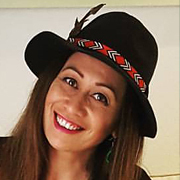
Lanita Ririnui-Ryan
When Lanita Ririnui started out in the television industry, she noticed there weren't many people like her — young, brown and female. "It set the scene for me to tell stories that provided a young, brown, wahine voice that was missing."
Ririnui grew up in Tauranga — the eldest of three children — to a Māori father and Māori/Cook Island mother. Tikanga Māori was an important part of her family’s life. “It was all about the reo, reclaiming the language," she says.
She was keen to study law, thanks to her interest in Māori land claims. But when a cousin told her about a television course at Auckland Institute of Technology (now AUT), her love of a challenge took hold. Ririnui was accepted into the programme, and in her third year, she fell for studio directing. “I thought it was such a cool buzz. You get one chance to get it right — everyone has to work together. That’s when I decided I loved TV.”
Her first job after graduating in 1999 was in the operations team at TVNZ, where she spent a year learning technical skills such as presentation and vision switching. In 2000, Ririnui was able to draw on her heritage for the first of many directing roles: for TV2’s Ahurea — which covered college kapa haka competition Te Ahurea Tino Rangatiratanga — and for Polyfest, the annual interschool celebration of Māori and Pasifika dance. The latter show was judged Best Entertainment Series at the 2000 TV Guide Television Awards.
In 2001 Ririnui directed her first documentary, In The Shed, about a predominantly Māori shearing gang in Queenstown. Over the next decade she directed many episodes of Māori youth show Mai Time and its successor I AM TV. During this time, the internet became a popular tool to interact with fans, and she saw the power of online media to draw in audiences. Since then she’s used it often to showcase her stories, such as interviews with wahine around the Pacific on website The Coconet TV.
Ririnui has directed for TV2’s popular Pasifika youth show, Fresh (including items for the very first episode) and Māori Television's tracing origins series Tātou Hono. Her love of sports led to one of her favourite gigs: seven years directing and producing on Māori Television’s flagship sports show, Code. “Sport is family to me," she says. "It’s my Dad, it’s my cousins, and it’s also excellence and achievement. These are qualities that are good for life lessons.”
Ririnui has also been a presenter: she hosted Māori Television improv series Bromasters, and was longtime co-host of arts show Mā Tātou.
In 2016, the mother of two co-produced Poi 360, with Amomai Pihama. The online interactive experience used documentaries, how to videos and a 360 degree performance recording to showcase the poi, and its origins. In 2017 a number of the Poi projects won awards at both California's Best Shorts Competition and the NZ Web Fest. Ririnui is especially proud of Poi 360 because it was made by a small team in six months — and because it put the stories of elderly poi experts on a worldwide platform. “If we don’t share their stories, and don’t put it out in new ways, the information will be lost.”
Ririnui's company Through the Fire is developing further projects which utilise 360 degree imagery.
Profile written by Natasha Harris
Sources include
Lanita Ririnui
Lanita Ryan website. Accessed 22 November 2017
Coconet TV website. Accessed 22 November 2017
Poi 360 website. Accessed 22 November 2017
'POI360' NZ On Air website (Broken link). Accessed 22 November 2017